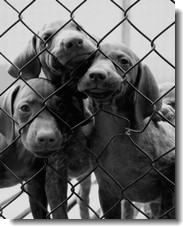
Puppy Mills: Effects On A Dog's Health
Due to the often indiscriminate breeding and poor conditions in puppy mills, puppies bred in these facilities tend to have significant health and social problems. Puppies raised in the mill's cramped environment can become poorly socialized to other dogs, and to humans.
Due to the over-breeding and inbreeding that takes place, most of these puppies have, or will develop, genetic defects or other health problems at some time in their lives. This can also be a result of poor breeding practices and unsanitary conditions at the puppy mill. With the dogs stacked on top of each other, feces from other dogs can fall into the lower cages onto the other dogs or can pile up in their own cage. This buildup of feces, if not cleaned, can interfere with puppies’ natural instincts to keep their area clean. As a result, the dogs get infections and their fur becomes matted, potentially attracting fleas. They can also suffer from severe dog allergies based on these various irritations and poor living conditions.
As the surviving mill dogs grow older, they are more prone to developing respiratory ailments and pneumonia, as well as hereditary defects such as hip dysplasia, an abnormal formation of the hip socket that, in its more severe form, can eventually cause crippling lameness and painful arthritis of the joints.
As the surviving mill dogs grow older, they are more prone to developing respiratory ailments and pneumonia, as well as hereditary defects such as hip dysplasia, an abnormal formation of the hip socket that, in its more severe form, can eventually cause crippling lameness and painful arthritis of the joints.
Pet Meds: Dogs | Pet Meds: Cats | Dog Health : By Breed | Cat Health : By Breed | Dog Grooming | Cat Grooming | Pet Top 10's | Pet Food Recipes

Being constantly locked up in the cages, dogs in puppy mills don't get the human socialization they need during their formative years. Since they don't get a reprieve from their cages to get exercise and play, and because there is very little human interaction, most of the dogs end up with behavior and temperament problems as they get older. Dogs that are born or raised in puppy mills are often nervous and unpredictable (sometimes unmanageable), and have unhealthy, erratic eating habits.
Next: International Laws Governing Puppy Mills
Next: International Laws Governing Puppy Mills
Puppy Mills: Introduction
Definition, History, Locations
Conditions In Puppy Mills
Health Effects On Dogs Raised In Puppy Mills
Puppy Mill Laws: USA, Canada, Australia, UK
Organizations Against
What You Can Do To Stop Puppy Mills
Definition, History, Locations
Conditions In Puppy Mills
Health Effects On Dogs Raised In Puppy Mills
Puppy Mill Laws: USA, Canada, Australia, UK
Organizations Against
What You Can Do To Stop Puppy Mills
They can also develop other health problems such as mange (a parasitic infestation of the skin of animals characterized by hair loss, itching and inflammation, all of which are caused by microscopic mites and requiring expensive, medicated shampoos and antibiotics to treat); open, bleeding wounds; tumors (both cancerous and benign); various infections of the ear and eye; rotten teeth and jaws; and skin matted with feces - conditions that don't usually get treated. Nails do not get cut, causing them to grow out and possibly curl up. In some cases, the dogs' paws can get cut and infected from the bottom wiring of the cage.
What DON'T We Have In Our Online Store?
Not much! Browse products made for dogs and cats in our online pet store!
Not much! Browse products made for dogs and cats in our online pet store!
Pet Top Lists!
You'll find everything from the smartest dogs to the friendliest cats in our pet top list pages!
You'll find everything from the smartest dogs to the friendliest cats in our pet top list pages!
Pet Meds: Dogs Pet Meds: Cats Common Dog Health Issues Common Cat Health Issues Dog Grooming Cat Grooming Pet Top 10's
Pet Health:Home
Copyright 2006-2011 PetMedsOnline.Org
